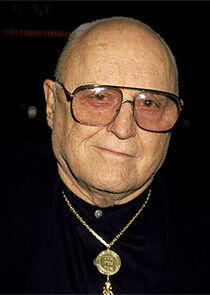
Rod Steiger
Steiger was born in Westhampton, New York, the son of a vaudevillian. He had a difficult childhood, running away from home to escape an alcoholic mother at the age of 16. After serving in the South Pacific during World War II, he began his acting career with television roles in 1947, and went on to garner critical acclaim for his portrayal of the main character in the teleplay "Marty" (1953). He made his stage debut in 1946, in a production of Curse You, Jack Dalton! at the Civic Repertory Theatre of Newark, and subsequently appeared in productions such as An Enemy of the People (1950), Clifford Odets's Night Music (1951), Seagulls Over Sorrento (1952), and Rashomon (1959).
Steiger made his film debut in Fred Zinnemann's Teresa in 1951, and subsequently appeared in films such as The Big Knife (1955), Oklahoma! (1955), Jubal (1956), Across the Bridge (1957), and Al Capone (1959). After his performance in The Pawnbroker in 1964, in which he played an embittered Jewish Holocaust survivor working as a pawnbroker in New York City, he portrayed an opportunistic Russian politician in David Lean's Doctor Zhivago (1965). In the Heat of the Night (1967) won five Academy Awards, including Best Picture and Best Actor for Steiger, who was lauded for his performance as a Mississippi police chief who learns to respect an African-American officer (Poitier) as they search for a killer. The following year, he played a serial killer of many guises in No Way to Treat a Lady.
During the 1970s, Steiger increasingly turned to European productions in his search for more demanding roles. He portrayed Napoleon Bonaparte in Waterloo (1970), a Mexican bandit in Sergio Leone's Duck, You Sucker! (1971), Benito Mussolini in Last Days of Mussolini (1975), and ended the decade playing a disturbed priest in The Amityville Horror (1979). By the 1980s, heart problems and depression took their toll on Steiger's career, and he found it difficult to find employment, agreeing to appear in low-budget B movies. One of his final roles was as judge H. Lee Sarokin in the prison drama The Hurricane (1999), which reunited him with In the Heat of the Night director Norman Jewison. Steiger was married five times, and had a daughter, opera singer Anna Steiger, and a son, Michael Steiger. He died of pneumonia and kidney failure as a result of complications from surgery for a gallbladder tumor in 2002, aged 77, in Los Angeles. His fifth wife was Joan Benedict Steiger.
Biography from the Wikipedia article Rod Steiger. Licensed under CC-BY-SA. Full list of contributors on Wikipedia.
Known For
Recently Updated Shows

Big Brother
Big Brother follows a group of people living together in a house outfitted with dozens of high-definition cameras and microphones recording their every move, 24 hours a day. Each week, the Houseguests will vote someone out of the house. At the end, the last remaining Houseguest will receive the grand prize of $500,000.

Who Wants to Be a Millionaire
In Who Wants to Be a Millionaire, 15 questions need to be answered by the contestants to win the 1 million dollar prize.

MasterChef
Three celebrated food experts put the latest group of contestants through a series of challenging elimination rounds and turn one home cook into a culinary master.

Guy's Grocery Games
In each episode of Guy's Grocery Games, four talented chefs compete in a number of challenges as they navigate their way through the aisles of a grocery store, adhering to "real-world" obstacles. Whether it is shopping on a budget, substituting out-of-stock ingredients or grabbing groceries at closing time, each chef has to shop, prepare, and plate three different dishes using whatever they can pull off the shelves. Ultimately, the food does the talking, as one-by-one the losing chefs "check out," by a rotating panel of judges that includes Melissa d'Arabian, Richard Blais, G. Garvin, Troy Johnson, Catherine McCord, Aarti Sequeira, among others. The last chef standing goes on a shopping spree of a lifetime worth up to $20,000!

The Repair Shop
The Repair Shop is a workshop of dreams, where broken or damaged cherished family heirlooms are brought back to life.
Furniture restorers, horologists, metal workers, ceramicists, upholsterers and all manner of skilled craftsmen and women have been brought together to work in one extraordinary space, restoring much-loved possessions to their former glory.
Many of these items have incredible stories behind them and a unique place in history: from an accordion played in the Blitz by a woman who is now in her 90s, to a beautifully crafted clock made by a father who was completely blind; a Pinball machine that is currently being used as a kitchen counter, and a Davenport desk with its trademark fake drawers which fooled burglars - and their crowbar.
The Repair Shop is an antidote to our throwaway culture and shines a light on the wonderful treasures to be found in homes across the country.


